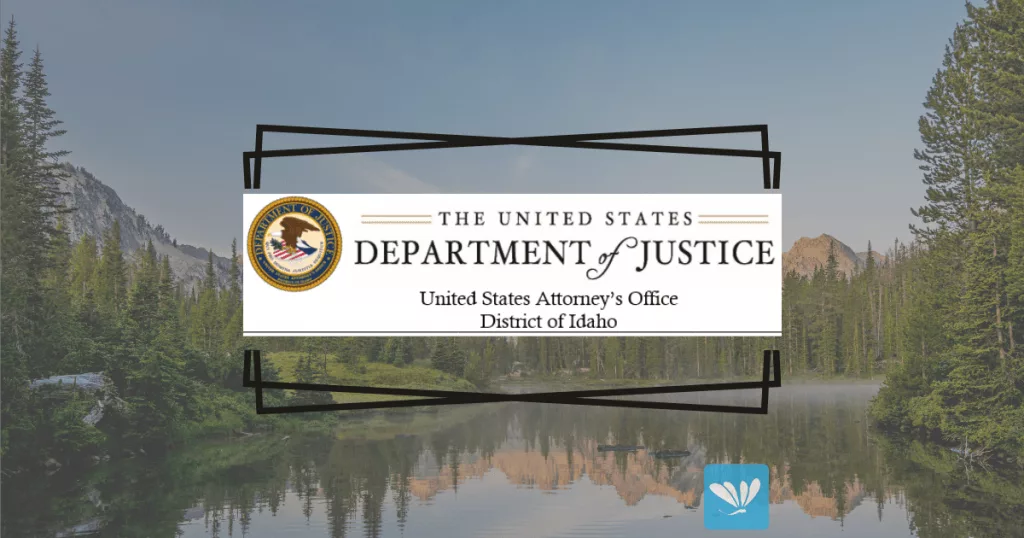(Boise, ID) – During the holiday season, online criminals increasingly target Idahoans through online scams and fraud schemes. Today, U.S. Attorney Josh Hurwit, along with the FBI, the Fort Hall Police Department, the Bannock County Prosecuting Attorney’s and Sheriff’s Offices, the Bonneville County Prosecuting Attorney’s and Sheriff’s Offices, the Idaho Falls Police Department, and the Pocatello Police Department, released a fourth and final PSA as part of their joint “Don’t Click December” Consumer Protection Campaign. The AARP is also participating in the announcement and the awareness campaign.
The campaign advises members of the public to exercise skepticism and caution when receiving unsolicited online, email, pop-up, or text communications from unknown or unverified sources. If there is any doubt about a link, message, or attachment, law enforcement cautions: “Don’t Click It.”
In the fourth PSA, available here, Pocatello Police Chief Roger Schei, Bonneville County Sheriff Samuel Hulse, and U.S. Attorney Josh Hurwit warn the public about the “Tech Support” scam and explain some of the ways in which individuals can protect themselves.
In this scam, criminals impersonate technology, banking, or government officials to convince victims to share personal information. You could get a pop-up on your computer indicating your accounts have been hacked and to call a number. But that number goes to the scammer who tries to manipulate you to gain access to your computer or accounts and takes your money to fix a non-existent problem. If you get such a request, Don’t Click It. Government entities and legitimate businesses will never call you or send unsolicited pop-up messages to ask for access to your computer.
This four-part series of PSAs were released in the weeks leading up to Christmas is an effort to alert the public to other common online fraud schemes that Idaho law enforcement has seen affect Idahoans.
Unfortunately, these are not the only schemes affecting the public, and new schemes arise all the time. Law enforcement hopes that the “Don’t Click December” Consumer Protection Campaign will raise public awareness and encourage individuals to talk to their friends and relatives about not clicking suspicious links, texts, messages, pop-ups, or attachments.
“Through the Don’t Click December campaign, we recognize that any Idahoan with a smartphone, tablet, or computer is likely to be targeted by online criminals at some point,” said U.S. Attorney Hurwit. “But we are not helpless. By being aware of common schemes and by talking to loved ones about the red flags of online fraud, every Idahoan can make a difference in this fight.”
“As technology continues to evolve and scammers become more aggressive and creative in their tactics, the public should be more vigilant than ever,” said Special Agent in Charge Shohini Sinha of the Salt Lake City FBI. “The FBI is committed to prevention and awareness efforts during the holiday season and throughout the year. Anyone who believes they are a victim of a scam should call their bank, report the crime to law enforcement, and file a complaint with the FBI’s Internet Crime Complaint Center at www.IC3.gov.”
The U.S. Attorney’s Office and its law enforcement partners recognize that we all must work to eliminate the stigma individuals may experience if they are victimized. There is no shame to falling victim to an online scheme, which are often designed by professional criminals, sophisticated, and tested repeatedly across the country.
For this reason, the “Don’t Click December” Consumer Protection Campaign also publicizes ways to report scams and incidents of fraud to the FBI and local law enforcement.
To learn more about these and other scams targeting Americans visit FBI.gov, and if you believe you have been victimized, take-action by reporting it to FBI’s Internet Crime Complaint Center at IC3.gov or by contacting your local law enforcement agency.





